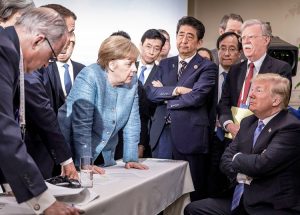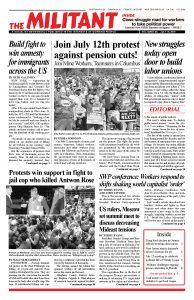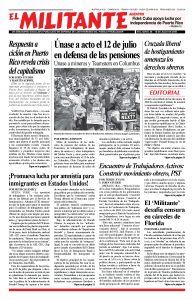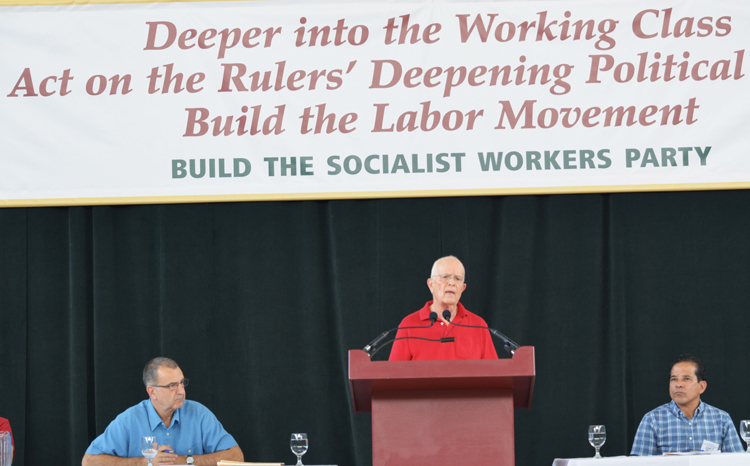This is the second of two articles on discussions and decisions at the Socialist Workers Party-sponsored Active Workers Conference, held June 14-16 in Oberlin, Ohio, and post-conference meeting of the party’s National Committee.
Last week’s article described how teachers’ strikes and fights in West Virginia and other states this year announced a new stage in the class struggle, inspiring workers across the U.S. “Build the Labor Movement” will be the axis of work of the party’s trade union fractions, SWP National Secretary Jack Barnes said, alongside weekly campaigning on workers’ doorsteps with the Militant and books on working-class politics, as well as participation in social and political struggles in the interests of working people.
The article also reviewed Barnes’ assessment of shifts in politics and the class struggle worldwide, including talks by President Donald Trump and North Korean head of state Kim Jong Un and wars and class conflict from Israel and Palestine to Syria and Iran.
Regardless of the rulers’ aims, Barnes said, the steps Washington is taking in these regions can have positive results for working people. They can help open space for workers to organize and gain combat experience against their own capitalist ruling classes; to strengthen solidarity across imperialist-stoked national and religious divisions; and to take steps toward building new working-class leadership.
Barnes took up the myth of the so-called G-7, European “Union” and NATO, and their accelerating disintegration.
The recent G-7 summit in Quebec underlined the place of Washington as still the world’s dominant imperialist economic and military power. Though the U.S. rulers have declined relative to their peak of ascendancy in the mid-1900s, their fellow G-7 “members” — the ruling families of Germany, France, the U.K., Japan, Italy and Canada — are all declining faster.

These annual rituals are supposed to be lavish showcases held at the expense of workers and farmers in their respective countries and worldwide. They peter out a day or two later with vapid “joint communiqués” agreed to before the meeting even began.
Not this one. Donald Trump arrived late and left early. This year’s summit was supposed to focus on sanctimonious pronouncements about climate change and “gender diversity.” But the U.S. president stunned participants (with the exception of Italy’s new prime minister) by proposing instead to readmit Moscow, expelled in 2014 after Vladimir Putin’s government invaded and annexed Crimea. “Whether you like it or not,” Trump said, the major capitalist powers “need [Russia] at the negotiating table.”
Then he left aghast the heads of state from Germany and France in particular by proposing that the seven members simply abolish all tariffs between them. That was hardly a welcome initiative, since the Berlin- and, to a lesser degree, Paris-dominated European “Union” is a protectionist bloc against Washington, rival imperialist powers and semicolonial countries.
U.S. rulers lost Cold War
The U.S. rulers emerged as the unalloyed victor from the second imperialist war, Barnes said. In the late 1940s and 1950s they hammered together a patchwork of global institutions and “alliances” to ratify their dominion over world markets and political and military influence. These included the United Nations, NATO, and others, which became the structure within which they presided over the world capitalist order for decades.
The feebler capitalist rulers in Europe banded together into what is today called the European Union. Ostensibly a “community,” it has become in fact a pump enriching the economically stronger capitalist rulers in Germany by sucking surplus value produced by workers and farmers from weaker ruling classes in southern Europe. Still, many in better-off liberal middle layers across the continent long clung to the illusion that the EU could evolve into a “United States of Europe,” a single state highly competitive on the world stage.
Washington launched the so-called Cold War in the late 1940s not to bring down the Stalinist regimes in the Soviet Union and their satellites across Eastern and Central Europe. For the U.S. rulers, it was about trying to hold off the inevitable sharpening of class struggle on both sides of what they called the “Iron Curtain.” They sought to convince workers “East” and “West” that they were enemies, not fellow workers with common class interests, in order to divide and weaken them.
The Stalinist regimes imploded between 1989 and 1991, gutted from the inside by bureaucratic privilege and anti-working-class oppression. Amid the wreckage, the U.S. rulers greedily stuffed their coffers, piecing off academic “privatization experts” at Harvard and elsewhere. As rising exploiting classes restored capitalism in these countries, the U.S. imperialists and their mouthpieces crowed that they had “won the Cold War.”
What’s happening today, however, is that NATO, the G-7, and other pillars of what was to be the “American Century” are being pulled apart. So is the European Union, as shown among other things by “Brexit” in the U.K., the Berlin-led plunder of Greece, and recent election results in Italy.
Prospects of an “ever-greater union,” impossible from the outset, Barnes said, are unraveling under the strains of the world capitalist economic, social and moral crisis. For decades the rulers of the dominant nations in Europe have laid claim to act as world powers, without maintaining the military might necessary to back that up. Today the German rulers have a mere handful of combat-ready fighter jets and no seaworthy submarines. And British imperialism’s air and naval power, once considerable even amid its post-World War II decline, faces accelerating decay.
Russia has emerged today as a regional capitalist power, defending its borders with military moves in eastern Ukraine and other former Soviet republics. It is extending its reach in the Middle East, especially its air and naval bases and access to the Mediterranean in Syria. There Moscow is the main force contending with the U.S. rulers, while Washington’s NATO “allies” in London and Paris have only a marginal role.

The U.S. rulers are seeking to open discussions with Moscow, Barnes pointed out. Shortly after the SWP conference ended, a meeting between Trump and Putin was set for July 16 in Helsinki, Finland. The agenda will be dominated by the Middle East. Russia’s capitalist government helped lay the groundwork for the talks by agreements with Israeli Prime Minister Benjamin Netanyahu to allow Tel Aviv to attack Iranian troops in Syria and Tehran-dominated Hezbollah forces from Lebanon that threaten Israel. In return, the Israeli government agreed not to challenge Russian interests in Syria or the tyrannical rule of its president, Bashar al-Assad.
Fights for wage hikes, safety
In the U.S., Barnes said, there is a rise in hiring and production, on the heels of decades of stagnating wages and employer assaults. Workers are more confident to fight for our class needs, starting with wage increases and safer job conditions. At the same time, a smaller percentage of the working class than ever is employed or has full-time work.
Working farmers too will seek ways to resist the ruinous impact of rising interests rates and low prices for their produce, which threaten to drive them off the land. Most already hold wage-earning jobs as well, to bring in enough to try to keep the farm and put food on the table.
A year ago the SWP had just begun rebuilding industrial fractions. Today most party members are organized in union fractions, ready to join co-workers and jump in with solidarity into fights by working people on the job, against cop brutality, for amnesty for immigrant workers, and around other social questions. We’re poised, Barnes said, to “build the labor movement,” as the conference banner says — and, as we do so, to build the Socialist Workers Party.
Liberals attack workers’ rights
Donald Trump’s foreign policy is winning broader support in the U.S. ruling families — and, for quite different reasons, from many working people. It is overwhelmingly the sons, daughters, and other kinfolk of workers and farmers who are killed, maimed, or haunted for a lifetime due to Washington’s wars. After 16 years of military adventures under George Bush and Barack Obama, working people welcome what they hope may be less combat and carnage.
Nonetheless, the liberal press and commentators, along with the middle-class left, remain consumed with hysterical “Resistance” to the outcome of the 2016 election, Barnes said. Their outlook — and their true target, working people — were graphically presented in an opinion column headlined “A Quisling and His Enablers” by Paul Krugman in the New York Times.
Trump himself is a “de facto foreign agent” of Moscow, Krugman says. But the Times columnist and Nobel Prize-winning economist then zeroes in on the “people who are enabling [this] betrayal of America.” Who’s that? His “base,” Krugman says. By that he means working people who voted for Trump not Hillary Clinton. The “base,” Krugman says, loves Trump for “the performative cruelty he exhibits toward racial minorities and the way he sticks his thumb in the eyes of ‘elites’” (among whom Krugman counts himself and his liberal colleagues).
This disparaging portrayal of workers — and not just those who voted for Trump, but tens of millions of us of all kinds, in the eyes of these bourgeois and middle-class voices — brings us to Krugman’s final sentence. If other elections turn out like 2016, he says, “America as we know it is finished.” Krugman and the comfortable layers he speaks for are determined to restrict workers’ constitutional rights, Barnes said, including the franchise and capacity to put someone like Trump not a Democrat in office.
Another Times column, a June 25 op-ed by Bryan Van Norden, made this anti-working-class goal even more overt. Under the headline “The Ignorant Do Not Have a Right to an Audience,” he takes aim at workers’ use of the First Amendment. A “stupid opinion” shouldn’t get the same circulation as an “intelligent one,” Van Norden says. He’s for meritocrats like himself having veto power over the rights of our class. (What an example of apologists for capitalist property relations and political rule! Barnes dissects their rationalizations in his recent book, Are They Rich Because They’re Smart? Class, Privilege and Learning Under Capitalism.)
This reactionary offensive is deadly dangerous for working people, who need the rights we’ve won in bloody battles even more today, as a new period of class struggle opens up.
We have an irreplaceable asset in the lessons of pioneer communists who came before us, Barnes told conference participants. From Marx and Engels, to Vladimir Lenin and Fidel Castro — the central leaders of the two great socialist revolutions of the 20th century — we can study and learn from what they wrote and what they did.
That’s why the party’s arsenal of books is so important: books by leaders of revolutionary struggles such as Thomas Sankara in the West African country Burkina Faso and Maurice Bishop in the Caribbean island of Grenada; by party members and other fighters in the Teamster strikes and organizing drives of the 1930s; by Malcolm X; by James P. Cannon, a founding leader of American communism; and scores of others.

“I want to learn more about what communists do, including as trade unionists. You can’t learn that in the abstract,” Samantha Hamlin told the Militant after Barnes’ talk. Hamlin, who was attending her first conference, recently joined the SWP and is looking forward to being part of one of the party’s trade union fractions. Hamlin participated in the 13th May Day International Brigade to Cuba this spring and has campaigned with SWP members door to door in Kentucky and at teacher protests in North Carolina.
Women’s rights and working class
“Few questions are more important than placing the emancipation of women on a scientific foundation,” said Mary-Alice Waters in one of two other conference talks, “Private Property and Women’s Oppression: The Working-Class Road to Emancipation.” There can be no socialist revolution, she said, “without fighting to end all forms of women’s degradation.”
The subjugation of women “isn’t inherent to human nature,” Waters said. Its origins aren’t in conflicts between men and women but “entwined with the way communal structures of preclass society disintegrated. In that process, the vast majority of toiling women and men were subjugated” by the emerging class that seized ownership of the growing accumulation of surplus production and wealth — a class that, for historical reasons, came to be dominated by men.
“The dawn of private property and origins of women’s oppression were the same,” Waters said. That’s been the case for millennia. With the worldwide spread of struggles against capitalist social relations since the 19th century, however, something different became possible, Waters said. It opened the fight to restore women’s equal position.

There are many wonderful books to read about this, Waters said.1 But most liberal college professors today deny there is any scientific foundation to women’s oppression and how it can be ended. Instead, they say that women and men — across centuries and continents — have lived in a “diversity of cultures” with no historical evolution or common features. This ahistorical approach conceals how women’s second-class status was born in the bloody emergence of class-divided society, in its varied and concrete forms.
Struggles in recent centuries to better women’s status are a product, Waters said, of their growing integration in the workforce, alongside men, under capitalism; scientific advances easing domestic labor and enabling birth control; and hard-fought gains by the labor movement, Blacks, and women. Just this year, she said, we can point to the victory in the fight for abortion rights in Ireland and women’s leadership in the wave of teachers’ battles.
“All women are oppressed as women,” Waters said. “But how to effectively fight this oppression and win is a class question.”
“The so-called #MeToo ‘movement’ is no example,” Waters explained. Posing the goal as “shaming men” is the opposite of what’s needed and possible to win co-workers and others, female and male, to understand how the rulers use women’s oppression to divide and weaken working people and the unions.
There was a lively discussion in a Q and A session led by Waters and Katherina Timpton after the talk. A few at the conference disagreed with Waters’ rejection of #MeToo exposés by wealthy and prominent Hollywood performers as a step forward in the fight for women’s emancipation.
Other participants responded by pointing to their own experience in industry and the unions. They described how anti-woman prejudice on the job and sexual harassment, whether by bosses or co-workers, are addressed by reaching out to fellow workers, male and female, and to the union. They described how working-class solidarity and unity can be forged in the fight against the bosses’ assaults on workers and our human dignity. This was the way forward, they said, not asking bosses to discipline or fire people.
As Malcolm X said about African-Americans in the U.S., Waters insisted, “Women too don’t need to be awakened to our oppression but to our worth. Awakened to a political course to fight together to overthrow class domination and oppression in all its forms.”
Working class is bearer of culture
“The crisis of capitalism is above all a cultural and moral crisis,” Dave Prince, a member of the SWP National Committee, said in his presentation on “The Proletarian Revolution and Culture.”
What’s called “culture” throughout history is an expression of the dominant class and its property relations, he said. “Under capitalism, great conquests of humanity are used to increase the exploitation of working people and to rationalize rule by the propertied classes. Scientific and technological advances are used for war.”
But our class can counter capitalism’s dog-eat-dog morality, as we organize to overcome divisions the capitalists impose on us. Workers who are communists speak and act as tribunes for all the oppressed.
With the workers’ conquest of political power and overturn of capitalist rule, Prince said, we can sweep away the property relations that create class antagonisms. We can transform social conditions, and in the process transform ourselves, building a new society in which — as Marx and Engels put it in the Communist Manifesto — “the free development of each is a condition for the free development of all.”
Drawing lessons from Lenin and Trotsky during the victorious Bolshevik Revolution in Russia, Prince said that vanguard workers can’t fall into the inward-looking trap of trying to create or, worse, to impose their own “proletarian culture.” Working-class interests lie in defending the greatest achievements of all prior class society. This communist continuity, Prince said, has been enriched — in word and in deed — by the leadership of the Cuban Revolution.
Advancing literacy and culture is crucial for working people, Prince said. “Without doing so, we can’t take the reins of power into our own hands and forge the tools essential to transform society for the benefit of all.”
Prince pointed to the play “Sankara” that ran earlier this year at London’s Cockpit Theatre (scheduled for another run this fall). It depicts Sankara’s efforts during the 1983-87 Burkina Faso Revolution to lead working people, Prince said, “to rid themselves of the imperialist lies that demean them and dominate their lives, opening up conditions for their transformation.” Many who came to the play to be entertained, Prince said, came away wanting to learn more about Sankara’s communist leadership and the Burkina Revolution.
Classes at the conference included “Class Struggle, Communism and the Jewish Question: From Palestine and Israel to Iran”; “The Political Legacy of the Grenada Revolution and Communist Leadership”; “Black Liberation and the Labor Movement”; and “Korea is One! U.S. Troops Out Now!”2
Openings for communist workers
The conference closed with presentations on political openings for the communist movement. These ranged from joining strikes and others workers’ and union battles, to activities supporting working people in Puerto Rico combating the devastation of U.S. colonial rule; from campaigning in workers’ neighborhoods with the Militant and books by revolutionary leaders; to participating in book fairs in the Kurdistan region of Iraq, the Philippines, and Cuba — and much more, as described each week in this working-class newspaper.
Holly Harkness, a party supporter who organizes the distribution center for Pathfinder Press in Atlanta, told conference participants that volunteers responsible to keep in stock the books used by the party have taken steps to reprint books more quickly. This helps improve the timeliness of the SWP’s response to developments in politics and the class struggle, she said.
The next day SWP supporters met to discuss how to advance their work. Supporters help design, format and proofread Pathfinder books; organize their printing; place them in retail bookstores, libraries, and large distributors like Amazon; pack and ship them to party branches; post each issue of the Militant to its (newly revamped!) website; and organize monthly financial contributions for the SWP’s political work.
At the closing conference event, Samir Hazboun described how he recently joined the party. Hazboun had won others where he lived in Tennessee to join brigades to Cuba to learn more about that workers and farmers revolution. Both in Cuba and when they returned home, he’s been working with SWP members not only to explain and defend Cuba’s socialist revolution but to above all emulate its example by organizing to make a revolution in the U.S.
The rise in labor struggles today helps recruit workers and young people to the Socialist Workers Party, Hazboun said.
The conference ended with a collection for a summer fund appeal of $33,800.
1 Among them are The Origin of the Family, Private Property, and the State by Frederick Engels; Is Biology Woman’s Destiny? and other titles by Evelyn Reed; Cosmetics, Fashions, and the Exploitation of Women by Reed and Joseph Hansen, with an introduction by Waters; Women In Cuba: The Making of a Revolution Within the Revolution by Vilma Espín and others; Women’s Liberation and the African Freedom Struggle by Thomas Sankara; a hard-to-find booklet by Lenin, The Emancipation of Women; and Women and the Family by Leon Trotsky.
2 Reading for these classes, sent to participants prior to the conference, included the SWP statement “For Recognition of a Palestinian State and of Israel”; “Revolution, Counterrevolution, and War in Iran”; and “US Out of Korea! An Unknown History” — all available on the Militant website — as well as the books Malcolm X, Black Liberation, and the Road to Workers Power by Jack Barnes; Maurice Bishop Speaks; and “The Second Assassination of Maurice Bishop” by Steve Clark in New International no. 6.


